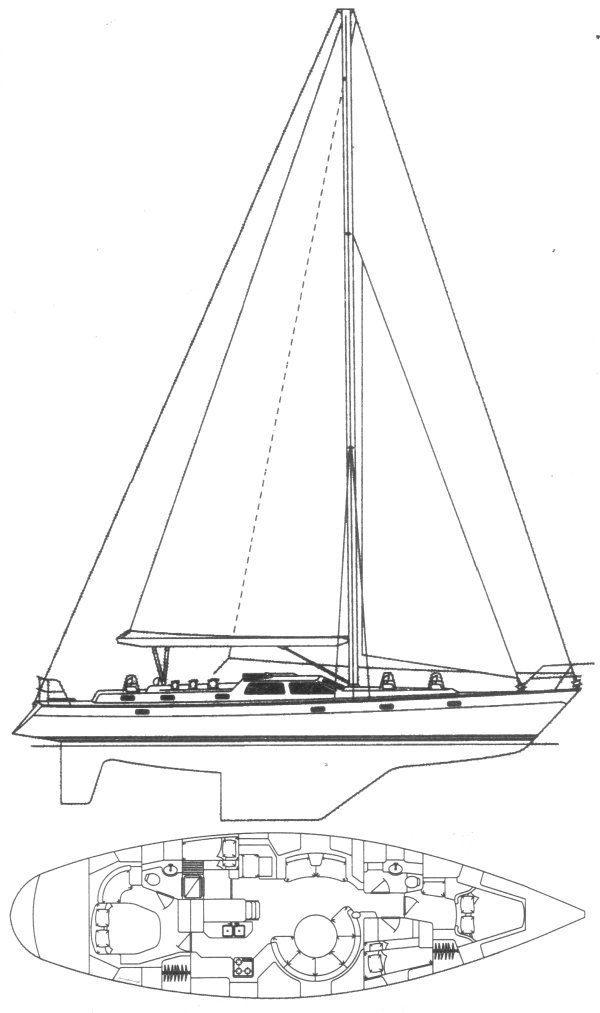The Oyster 55, a distinguished sailing yacht from the esteemed British builder Oyster Marine (now Oyster Yachts), embodies the brand's commitment to robust construction, exquisite craftsmanship, and timeless design. Designed by the renowned naval architecture firm Holman & Pye, particularly Don Pye, this model was conceived as a highly capable bluewater cruiser, ideally suited for extended voyages and liveaboard sailing. With its generous proportions and strong build, the Oyster 55 has earned a reputation as a powerful offshore performer, appealing to discerning sailors seeking both comfort and reliability on the open ocean.
Oyster 55 Information, Review, Specs

- Make
- Oyster
- Model
- 55
- Number Built
- 55
- Production Year(s)
- 1986 - ??
History and Design
The production of the Oyster 55 began in 1986, evolving from the earlier Oyster 53 model, and was designed by Holman & Pye. During this era, Oyster Marine was establishing its reputation for crafting yachts that combined performance with practical design, a philosophy evident in the 55's creation. The 55 was considered a "tough act" to follow, underscoring its significance in Oyster's lineage.
Throughout its production run, the Oyster 55, sometimes referred to as the Oyster HP53/55, featured a number of variations, though most were built with a cutter rig. Reflecting Oyster's semi-custom build approach, original owners often had choices regarding three or four cabin layouts, interior finishes, wood types, and decor, allowing for a personalized touch.
Sailing Performance and Handling
The Oyster 55 is unequivocally designed for offshore capability. With a reported sail area of 1,595 square feet and a displacement of 51,000 pounds, it boasts a Sail Area to Displacement ratio of approximately 22.48, suggesting commendable performance in lighter winds. Its substantial displacement, combined with a 45.43-foot waterline, results in a high Displacement to Length ratio of around 543.13, characterizing it as a heavy, traditional cruiser built for comfort and stability rather than outright speed.
Despite a Ballast to Displacement ratio of approximately 0.26, indicating a solid yet not exceptionally stiff design, the Oyster 55 is widely regarded as a powerful offshore cruiser. Owners consistently rate the Oyster 55 highly for its offshore capabilities, with reader surveys assigning it an overall offshore rating of 9.5. The cutter rig, often configured as a masthead sloop with a dedicated cutter stay, provides versatility for double-head arrangements or managing sails in heavy weather. Owners have particularly praised the boat's reefing setup, highlighting its suitability for varied conditions.
Accommodations and Layout
While specific headroom details are not always specified, Oyster yachts are renowned for their meticulously crafted and high-quality interiors, emphasizing comfort and practicality for extended cruising, 15]. The Oyster 55 typically features a layout well-suited for life at sea. A common arrangement includes a saloon that is a couple of steps up from the galley, creating a distinct, seaway-friendly aisle.
The galley itself is often described as superb for an offshore boat, emphasizing its functionality while underway. The yacht generally provides a large head compartment, accessible from a common passageway, which includes a toilet, washbasin, and a dedicated shower. The semi-custom nature of its build meant that owners could opt for various cabin configurations, including three or four layouts, allowing for tailored living spaces. Interior finishes typically feature high-quality wood and craftsmanship, aligning with Oyster's luxury bluewater cruising identity.
Owner's Perspectives
Owners of the Oyster 55 consistently commend its robust construction and exceptional bluewater capabilities. Its strong offshore rating in reader surveys underscores its suitability for long-distance cruising. While the quality of sea berths has been questioned by some owners, this is generally considered a minor issue, easily mitigated by utilizing lee cloths to secure occupants in a seaway. The ease and effectiveness of the reefing system are frequently highlighted as a strength, providing confidence when managing sails in challenging conditions. The strong community among Oyster owners further enhances the ownership experience, with events like the Oyster World Rally celebrating the yachts' bluewater prowess and fostering lasting friendships.
Measurements
Construction & Hull
- Construction Material
- Fiberglass (Solid)
- Hull Type
- Monohull Sailboat
- Keel Type
- Fin
- Rudder
- 1x Skeg-Hung
- Ballast
- 13359 lbs
- Displacement
- 51000 lbs
- Water Capacity
- 290 gal
- Fuel Capacity
- 158 gal
Engine
- Engine Make
- Perkins
- Engine Model
- —
- Engine Type
- —
- Engine HP
- 80
- Engine Count
- 1
- Drive Type
- —
- Fuel Type
- Diesel
Rig & Sails
- Rig Type
- Cutter
- P (Main Luff)
- -
- E (Main Foot)
- -
- I (Foretriangle Height)
- -
- J (Foretriangle Base)
- -
- Forestay Length (est)
- -
- Main Sail Area
- -
- Foretriangle Sail Area
- -
- Total Sail Area (Reported)
- 1595 sqft
- Total Sail Area (Calc)
- -
Dimensions
- LOA
- 56.25 ft
- LWL
- 45.43 ft
- Beam
- 15.75 ft
- Draft
- 7.5 ft
- Max Headroom
- -
- Air Draft
- -
Calculations
- Hull Speed
- 9.03 kn
- Pounds per Inch Immersion
- 2